Inconvenient but Crucial: Cutting Down on Plastic
By Huang Zi-ling (黃紫翎)
Photos by Huang Shi-ze (黃世澤)
Abridged and translated by Syharn Shen (沈思含)
Inconvenient but Crucial: Cutting Down on Plastic
By Huang Zi-ling (黃紫翎)
Photos by Huang Shi-ze (黃世澤)
Abridged and translated
by Syharn Shen (沈思含)
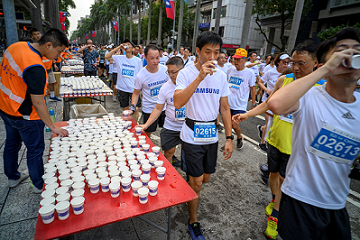
At running events, water is offered at aid stations for participants to slake their thirst, but single-use cups create huge amounts of waste.
It was around 2015. I was running a marathon on the scenic Houli tableland in central Taiwan. Along the road, I could enjoy the unique landscape of the reddish Flaming Mountain at a distance as well as the flowing Daan River. Drenched in sweat, I was about to quench my thirst at an aid station when I was suddenly taken aback by a table lined with over 1,000 disposable plastic cups of water as well as cooling sponges. I did a rough estimate in my head. With nearly 5,000 runners in the race and an aid station at every three to five kilometers, the marathon used more than 20,000 plastic cups and 20,000 sponges. The numbers were shocking.
According to Greenpeace Taiwan's estimate in 2017, at least four million disposable cups are used every year at around 1,000 running events held in Taiwan. With just one marathon creating tens of thousands of non-degradable waste, how will the numbers look like if we calculated the waste created by all human activity? To prevent further damage to the environment and potential hazards to our health, reducing the use of plastic—not only in sports events but also in our everyday lives—is an important step Taiwan and all countries in the world need to take.
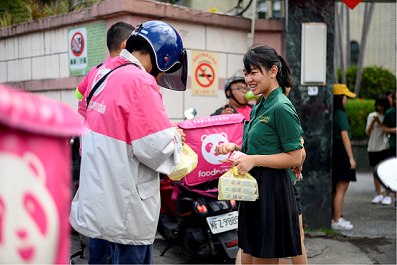
With the popularization of food delivery in Taiwan, the consumption of plastic and single-use items has also increased.
In Taiwan, policies to reduce plastic consumption have been carried out in as early as 2002 and implemented in stages over the years. In 2018, the provision of free plastic bags was banned from a list of stores and shops, and a timetable was set out to reduce single-use plastic products such as straws, cups, and tableware. Starting July 2019, institutions in the public sector, schools, and 8,000 businesses including department stores, shopping centers, and fast food chains have been banned from providing consumers with plastic straws.
However, according to statistics by the Ministry of Economic Affairs, the domestic sale of plastic bags (including indirect exports) over the past 17 years has not decreased but actually increased—from 146,485 metric tons in 2002 to 167,635 metric tons in 2019. Revenues from domestic sales of plastic tableware and containers have also increased. According to Taiwan's Environmental Protection Administration (EPA), from 2002 to 2018, an average of 780 plastic bags have been used per person per year in Taiwan, which means that one person used more than two plastic bags a day. Director-General of EPA's Department of Waste Management Lai Ying-Ying (賴瑩瑩) explained that changes in consumer behavior—in particular the embrace of online shopping—have led to a rapid increase in the use of plastic packaging materials.
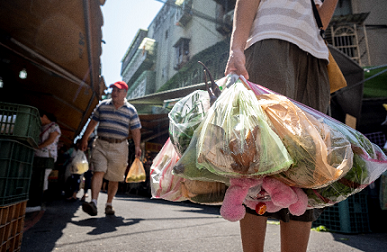
In Taiwan's traditional markets, it is common to see local people with tons of plastic bags carrying fresh food and produce around.
Cup Rentals: A New Choice
Though environmental awareness among the general public in Taiwan has increased in recent years, the mainstream mindset of always putting convenience and customers first have still led to the rampant overuse of plastic products. Our modern lives are filled with all kinds of disposable tableware, bowls, plates as well as plastic water bottles and cups. Are single-use products really the only choice for a convenient lifestyle?
Lin Chih-lung (林志龍), founder of Chingpiao—a social enterprise providing rental services of reusable cups and tableware—has been working on an alternative choice. A lover of drinks, Lin well knows how short-lived are the plastic cups filled with drinks sold by shops. He set up Chingpiao in 2016 after learning about Ecocup, a social enterprise from France offering rental of cups, as well as other rental projects from Germany, Japan, and Hong Kong.
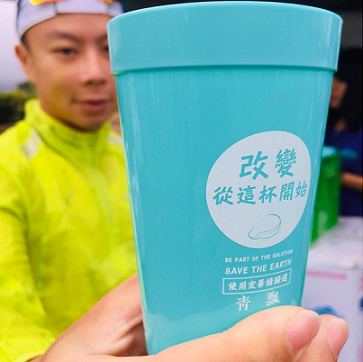
To reduce the environmental impact of single-use items, some event organizers have started to adopt reusable cups. (Photo provided by Chingpiao)
Chingpiao has since been offering rental services of tableware and cups for music festivals, markets, school fairs, running events, conferences, etc. Event organizers can book the rental service online, pay the rent and a deposit fee on the day of the event, return them after the event, and get the deposit fee back.
Lin observed that Chingpiao's customers mainly fall within the age range of 25 to 35 years old and are those willing to take action in supporting environmental causes. "Some people think that renting tableware is inconvenient and may even have concerns about hygiene," said Lin. "At a restaurant, we may use plates and bowls made of porcelain or stainless steel, but we don't fret about hygiene issues." To ensure hygiene and safety, Chingpiao's cups and tableware are sent to professional and qualified cleaning facilities.
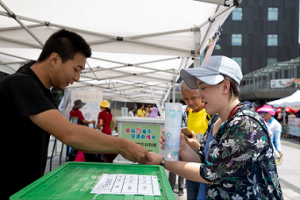
In Taiwan, Chingpiao's rental system provides event organizers with reusable cups and tableware to be used at events and activities. (Photo by Wang Rong-hui)
Renting cups or tableware is not a new thing. In Germany, there is a tradition of renting red wine glasses for Christmas fairs around the country as well as rentals of beer mugs during Oktoberfest. In recent years, a German social enterprise, RECUP, has also started to offer rental services of coffee cups.
Set up in Munich in 2016, RECUP offers convenient rental services by partnering with over 1,000 coffee shops all around Germany. In the morning, a customer in Frankfurt can visit a partner coffee shop and deposit one euro to rent a cup made from recycled plastic, buy coffee to go and take a train to Cologne, and return the cup to a partnering shop an hour later to get the deposit fee back.
The rental service works similarly to Ubike in Taiwan, which rents bikes that can be returned at multiple locations. Cups from RECUP are sent to professional cleaning facilities before they are returned to partnering shops for reuse. Currently, there are over 350,000 RECUP cups used in Germany. There are also similar projects in France, Japan, and Singapore.
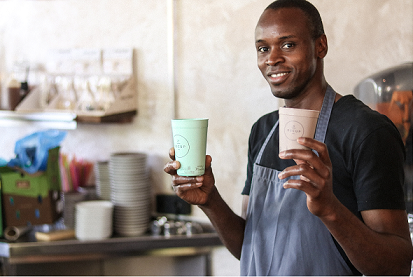
In Germany, RECUP offers a rental system of reusable coffee cups that can be returned at multiple locations across the country. (Photo provided by RECUP)
Taiwan, with drink shops everywhere, is an ideal place to implement cup rental services. In Tainan City, Good to Go is a project for customers to borrow and return glass cups at partner shops without any deposit fee. On Tainan's Zhengxin Street alone—where Good to Go was launched—the project has already cut down the consumption of 4,800 single-use cups. The project has also been adopted in 60 drink shops in other cities of the island.
Reducing Plastic Waste in Markets
In addition to drink shops, traditional markets and night markets in Taiwan have also started to reduce the use of plastic. Taking Yongping Market in New Taipei City for example, a movement to reduce plastic consumption has been launched by the market's council and volunteers from the Society of Wilderness (SOW).
Li Jia-rong (李佳蓉), one of the SOW volunteers, only took training classes at first to explain the importance of reducing plastic consumption. But later, she put into practice what she learned in class and shared with the market's vendors how to cut down on plastic. She also called on the market vendors to encourage customers to bring their own food containers. At the beginning, most vendors were reluctant to give up plastic bags as they had concerns about hygiene. Li said, "It's actually not hard to go plastic free. We encourage vendors to ask their customers if they need a plastic bag or not. With a simple question, the use of plastic bags has significantly decreased." Vendors can acknowledge and praise customers who bring their own reusable bags or containers. And for customers who want a plastic bag, vendors can kindly remind them that there is a discount if they bring their own containers.
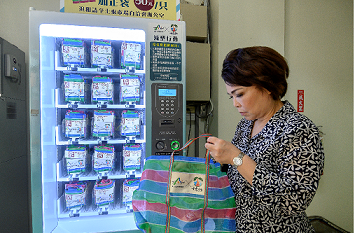
Taipei's Shidong Market offers a rental machine for customers to borrow reusable grocery bags by depositing a small fee.
There are also customers who have taken the initiative to go plastic-free. Hoping to cut down on plastic and prevent hazards from plasticizers in plastic food containers, the staff at a dental clinic near the market requested the market's breakfast stands, noodle shops, and other eateries to keep reusable bowls and plates. Some shops give a discount when customers bring their own shopping bags, and eateries have also replaced disposable tableware with metal or porcelain ones.
In Taipei City, Shitong Market offers a renting machine for customers to borrow reusable shopping bags with a small deposit fee, which is given back when they return the bag within 30 days. There are also several shops in the market that only provide second-hand paper bags.
Changing consumer habits to reduce plastic consumption is not something that can be achieved overnight. It took many years before all the food stands at Ningxia Night Market completely gave up single-use items for stainless steel and porcelain tableware. The night market's administrator Lin Ding-guo (林定國) said that when all the stands in the market replaced disposable tableware with reusable ones, many vendors viewed the change as a hassle because sinks had to be installed and the overall costs have increased. However, Lin added that the reduction of single-use tableware has become one of the night market's features, attracting countless of local and international visitors.
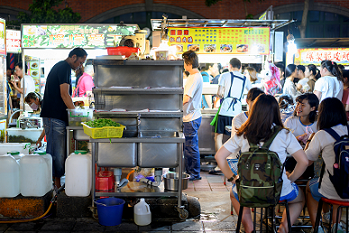
For many years, Ningxia Night Market has been working to reduce plastic waste from single-use items by replacing disposable tableware with reusable ones and setting up sinks for dishwashing.
Local governments in Taiwan have also taken action to reduce plastic consumption. For example, the New Taipei City’s Environmental Protection Department has launched its cup rental system Ucup in 2018. Used at a running event, music festival, and school fair, the rental system has already cut down the use of 3,800 single-use cups. Furthermore, New Taipei City has set up stations with second-hand paper bags and plastic bags in supermarkets, convenience stores, schools, and communities for the general public to reuse bags and reduce waste.
In addition to promoting the reuse of products, policies to cut down on plastic consumption are also crucial. In 2017, Taiwan's Environmental Protection Administration (EPA) and environmental groups have come up with the "Action Plan of Marine Debris Governance in Taiwan," which includes the decrease in the supply of plastic products to change consumer habits with the aim to completely ban single-use plastic products in Taiwan by 2030.
Other countries in Europe, Asia, Africa, and Oceania have also implemented policies to reduce the use of plastic. According to Greenpeace Taiwan, over 60% of the countries in Africa have banned plastic bags. And in Kenya, anyone manufacturing, importing, or selling a plastic bag could be fined up to US$40,000 or face a jail term.
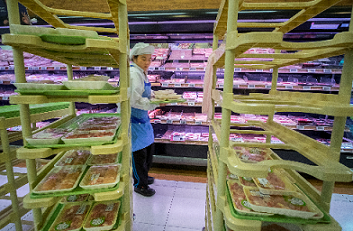
Convenient and cheap, plastic is still used by many supermarkets to package their products.
Bangladesh is one of the first countries in the world to ban plastic bags. In the 1990s, plastic bags were found to have choked the country's drainage system during devastating floods that resulted in heavy casualties. In 2002, the Bangladesh government completely banned the manufacturing, importing, marketing, and selling of plastic bags. Since the ban was imposed, the traditional jute industry has been revived. Nowadays, bags made from jute in Bangladesh are often sold in shops featuring fair trade products.
Alternatives to Plastic Products
To reduce the production and consumption of plastic, many businesses and scientists have tried to develop alternative materials to plastic bags, such as biodegradable bags made from corn, sugar cane, or rice starch. Polylactic acid (PLA), usually made from fermented corn starch, is a common substitute for plastic containers and packaging.
Carrefour is one of the businesses that have already started transitioning to plastic alternatives. "Currently, nearly 100% of our packaging of fresh produce and meat has replaced polystyrene with PLA, and we use thin PE wraps that contain no plasticizers to cover fresh products," said Li Zheng-ze (李政澤), a public relations spokesperson for Carrefour in Taiwan. He also added that the supermarket is offering more fresh produce without any packaging.
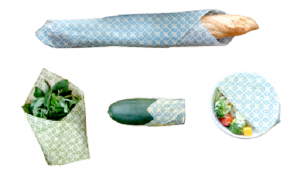
Food wraps made with beeswax and cotton cloth can replace plastic food wraps to keep food and ingredients fresh. (Picture provided by Zen Zhou)
However, the use of PLA has its drawbacks. First, its biodegradation process requires an industrial composting facility, but currently there is no such facility in Taiwan. Also, PLA products easily break apart, so its value decreases after recycling and transportation. Section chief Wang Yao-cheng (王耀晟) from EPA's Department of Waste Management also said that many people often confuse PLA with plastic, so they throw PLA products into plastic recycling stations, resulting in challenges and complications in the plastic recycling process.
In addition, some businesses add plastic to PLA to enhance its durability and resistance to heat, creating an end product that is difficult to recycle and biodegrade. As a result, most PLA products still end up in the incinerator to be burnt. Ironically, PLA—often considered a "green plastic"—has turned into non-recycled waste that contributes to plastic pollution. "Without adequate education to the public on materials such as PLA, customers may use them liberally, thinking that PLA is environmentally friendly, or they may recycle PLA as plastic," commented Chang Kai-ting (張凱婷), head of Greenpeace Taiwan's plastic reduction project.
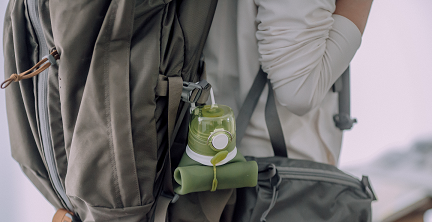
A foldable and reusable bottle made of silicone is an alternative product to plastic bottles. (Picture provided by Zen Zhou)
Other alternative product to plastic is the increasingly popular beeswax food wraps. As beeswax is antibacterial, beeswax food wraps are used to wrap fresh fruits and vegetables, bread and cheese, and can be used to cover bowls to keep food fresh. First introduced by Bee's Wrap in 2012, beeswax food wraps are made of simple ingredients—cotton cloth, beeswax, and jojoba oil. A simple alternative to plastic food wraps that people can even make at home, beeswax food wraps are well-received among environmentalists and those taking action to reduce plastic consumption.
Silicone is another alternative to plastic that is light and waterproof. Zen Zhou is a company in Taiwan that has developed bags, cups, and straws made from silicone. Silicone is non-toxic, can withstand temperatures from -40°C to 230°C, and doesn't break or turn brittle like plastic. In recent years, it has become an alternative material to plastic that has been made into zipper bags, tableware, water bottles, lids, etc., attracting consumers who want to go plastic-free.
On a Path to Becoming Greener
As policies to reduce plastic are implemented and different alternatives to plastic have emerged, how can consumers keep up with all the new developments in going green? Online social networks may be a platform to learn, share and spread information.

Lightweight and durable, plastic bags have long become must-haves for many buying food on-the-go. To reduce plastic consumption, businesses in Taiwan have developed alternative products to plastic bags, such as reusable, leak-free, and foldable zipper bags made of silicone that can be heated or put into the refrigerator and freezer. (Pictures provided by Zen Zhou)
Gao Qiao-lun (高巧倫), administrator of a Facebook public group that advocates and shares information on going plastic-free, shared an experience that led her to set up the group that now has over 200,000 members. "In 2016, I heard from a talk that on one of the most remote places on earth—an island in the middle of the Pacific Ocean—the albatross there has been feeding its chicks with plastic waste from the ocean. I was left in shock, and it was then that I truly felt the severity of the marine debris crisis."
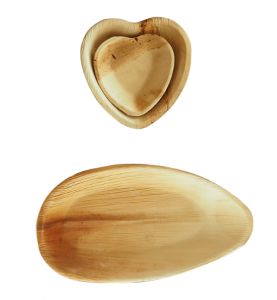
Natural plates made of fallen palm tree leaves are not only beautiful alternatives to plastic or coated paper plates, but they can also biodegrade in 6 to 12 weeks. (Picture provided by Zen Zhou)
After the talk, Gao immediately set up the Facebook group for people to share how they lead an eco-friendly lifestyle and ways to go plastic-free in daily life. For example, one member posted reusing an empty glass jar as a cup for hot and cold drinks. Another member shared about the transformation of her husband, who used to scoff at bringing containers to buy food but now always prepares them when ordering take-out food.
"Bringing containers to buy take-away food may alter businesses’ usual way of doing things. If businesses refuse to use our containers, there is no need to criticize them," said Gao, who believes that a plastic-free lifestyle starts with willingness to make changes in the first place. She has found that more restaurants nowadays are accepting customers to bring their own food containers, with some even giving discounts when they do so. She has also witnessed how many eateries or restaurants have initially refused to cut down on plastic but have slowly come to accept and even embrace ways to reduce plastic consumption.
Moving Towards a World with Less Plastic
Liuqiu, located southwest to the island of Taiwan, is an offshore island full of coral reefs and marine resources. Home to the green sea turtle, Liuqiu Island attracts hundreds of thousands of tourists every year. But, the thriving tourism also creates a great amount of garbage that end up as marine debris. Islander Divers, a local diving team, has witnessed a sea turtle excrete a plastic bag from its cloaca.
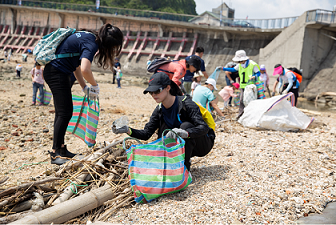
Plastics are one of the most common forms of marine debris. (Photo by Wang Rong-hui)
To prevent further deterioration of the natural environment, the Liuqiu government worked together with local groups to launch a stainless steel cup rental system to decrease the use of disposable cups. Most tourists are willing to join the program, so the system has had a positive impact on the island. However, Guo Fu (郭芙), Deputy Chief Executive of the ocean protection group HiiN Studio, said that most marine debris around Liuqiu come from the island of Taiwan. “For a comprehensive action to reduce marine debris, it is not enough to reduce waste in Liuqiu. It is also important that we deal with debris floating in from Taiwan," said Guo.
The environmental problems brought by plastics are shared by all life on Earth, as several popular online videos have shown. Whether the videos are about a marine scientist removing a plastic straw from the nostril of a sea turtle or a stranded whale in Thailand with 80 kilos of plastic bags found in its stomach, they all clearly show that plastic products have been spread to every corner of the world. Plastics will even become part of our geological cycle, as some geologists have suggested. Patricia Corcoran stated that plastic has been contributing to the formation of plastiglomerate, a plastic-rock hybrid that will become a geological layer and record on Earth that points to a civilization with massive consumption of petrochemicals and plastic.
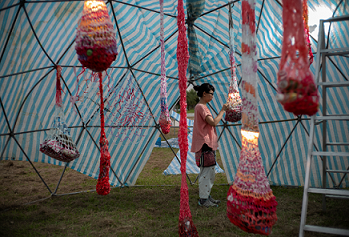
By creating art with disposed plastic bags, artist Fay Yang hopes to raise public awareness to the problem of plastic pollution so people can take action and make changes in daily life. (Photo by Tzu Cheng Liu)
Reducing the consumption of single-use plastic products can no longer just be the advocacy of environmentalists or implementation of government policies. It has to become the shared responsibility of everyone. Natural scientists and artists are also calling on people to learn and face the environmental crises brought by plastic. Artist Fay Yang (楊芳宜), for instance, has weaved disposed plastic bags into a whale that has eaten garbage produced by humans. Through her creations, Yang hopes to raise public awareness to the marine debris crisis.
There are many ways to cut down on our consumption of plastic. Raising awareness, using green products, supporting shops with reusable tableware, and setting up a complete and comprehensive system of recycling are steps that we can all take on our road to a cleaner world with less plastic.
Contact Us | Plan a Visit | Donate
8 Lide Road, Beitou 11259, Taipei, Taiwan
886-2-2898-9999
005741@daaitv.com
©Tzu Chi Culture and Communication Foundation
All rights reserved.
